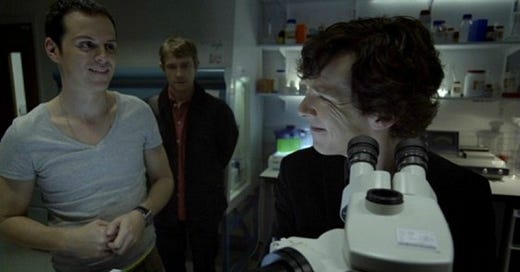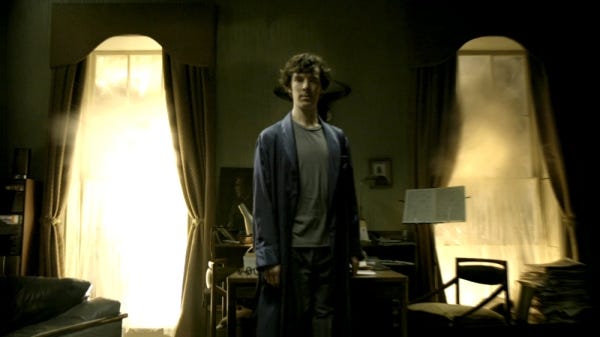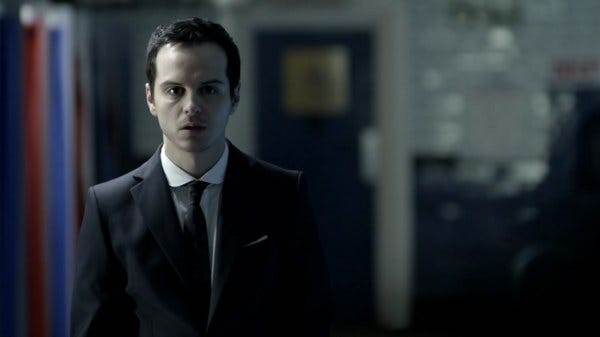Written by Prof. Jenn
REMINDER: I am writing these as RETROSPECTIVE reviews, so I will be discussing reveals, revolutions of cliffhangers, ends of plots, etc. If you are reading these reviews without having seen the eps, a) what is wrong with you? Go watch them now! and b) these reviews are not for you till you’ve seen them.
ALSO: This was originally written for Sherlock’s Home in 2015, and, as a UK-based site, my spelling and punctuation reflects that. This is slightly adapted from the original post.
*
‘The Great Game’ is great indeed, as there are not one, but three games (actually more than that even) intertwined into the plot, and thereby we learn finally just how nefarious Moriarty is.
This episode opens with Sherlock questioning a prisoner in Minsk, and it’s a delightful scene because it’s more about the games with words and correcting the young prisoner’s grammar than anything else. Then we move from grammar humor straight to a scene out of the original canon: Sherlock is bored, and shooting a design into the wall at 221B Baker street with live rounds.
The dialogue between Sherlock and John is straight out of Doyle (mostly verbatim, actually), when John is astonished to find that Sherlock doesn’t know the Earth travels ‘round the Sun. We get this series’ version of the famous Attic Speech,* wherein Holmes explains that his brain is an attic (in this updated case, it’s a hard drive) and he only stores essential information there that’s relevant to his work.
Sherlock’s complaints of boredom end abruptly, however, when the force from an explosion blows out the window behind him and knocks him down. This explosion means the Great Game is afoot.
*I go into the Attic Speech in detail on Monday’s More You Holmes post—check it out for more about that famous Holmesian monologue.
We find that an identical phone to the one from ‘A Study in Pink’ was left for Sherlock in the blast (we also learn that everyone on the police force reads John’s blog–a delightful moment of discovery), and the perpetrator puts three tests to Sherlock through the rest of the episode. Sherlock must solve the cases in time to save forced-suicide-bombers’ lives. Plus, there’s the mystery of the Bruce-Partington plans given to Sherlock by brother Mycroft, just like in the original, and actually the solving of that case is nearly identical to both that original story combined with ‘The Naval Treaty.’
Each case is more tense than the one before, until we come to the Painting Is A Fake mystery, when Sherlock begs for more time, and the unbearably stressful sound of a little child’s voice echoes through the gallery with a mere ten second countdown.
And of course, we get the confrontation scene between Moriarty and Sherlock at the very end, with a tooth-grinding cliffhanger. I am thankful I came to this show when Series Two was being broadcast–I cannot imagine what audiences went through for two years while they waited for the resolution to that one! And what a resolution! But I’ll talk about that in the next retro review… I would aver, in fact, that this cliffhanger is much more intense than the cliffhanger at the end of The Reichenbach Fall, in that it’s all three lives literally in the balance; it’s much more ‘what the heck is going to happen next?!’ whereas Reichenbach’s climax is more of a ‘hm, I wonder how he did that.’
FINAL THOUGHT: The final confrontation scene between Sherlock and Moriarty was originally meant to be only read in auditions, it wasn’t going to be part of the script at all. Apparently (according to Mofftiss on the Blu-Ray commentary), Andrew Scott nailed the reading so well in auditions that they had to include it. It shares lots of dialogue from the original story ‘The Final Problem,’ too: some verbatim. Here are some comparisons (Ariane’s Sherlock transcripts are pretty nifty. Find them here.):
From Sherlock: ‘Is that a British Army Browning L9A1 in your pocket, or are you just pleased to see me?’
From Doyle: ‘It is a dangerous habit to finger loaded firearms in the pocket of one’s dressing-gown.’
From Sherlock: ‘You can’t be allowed to continue. You just can’t. I would try to convince you but everything I have to say has already crossed your mind.’
‘Then probably my answer has crossed yours.’
From Doyle: ‘All that I have to say has already crossed your mind,’ said he. ‘Then possibly my answer has crossed yours,’ I replied.
It’s also a fun note that apparently Scott didn’t know about the famous description of original Moriarty; that ‘his face protrudes forward, and is forever slowly oscillating from side to side in a curiously reptilian fashion.’ Mark Gatiss told him about it just before the shoot, and what we enjoy in the scene is what Scott rolled with.
EASTER EGG: On the TV report of Connie Prince’s death, there’s a ticker at the bottom of the screen that says, ‘Connie Prince, dead at 48.’ Then we get a hard cut to her body at the morgue, where Lestrade rattles off her stats as, ‘Connie Prince, 54.’ Ah, celebrities…
RATING: 5 Greenwich pips out of 5
Tell me what you think of this episode in the comments!






